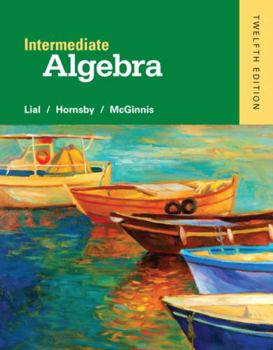Intermediate Algebra
Select Format
Select Condition 
Book Overview
Is there anything more beautiful than an "A" in Algebra? Not to the Lial team Marge Lial, John Hornsby, and Terry McGinnis write their textbooks and accompanying resources with one goal in mind: giving students and teachers all the tools they need to achieve success. With this revision of the Lial Developmental Algebra Series, the team has further refined the presentation and exercises throughout the text. They offer several exciting new resources...
Format:Hardcover
Language:English
ISBN:0321969359
ISBN13:9780321969354
Release Date:December 2014
Publisher:Pearson
Length:704 Pages
Weight:3.48 lbs.
Dimensions:1.3" x 8.8" x 11.2"
Customer Reviews
5 ratings
Same book - half price!
Published by Thriftbooks.com User , 16 years ago
This book was TWICE the price at the school bookstore. Check your ISBNs and buy text books online!
2+2=7
Published by Thriftbooks.com User , 17 years ago
Why do we even need math? I mean, WTF?? Bottom line, if you stink at math, this book will only frustrate you. Just stick to problems you can count on your fingers.
Further adventures with algebra...
Published by Thriftbooks.com User , 20 years ago
This book is currently being used by the community college where I tutor as a book for the internet version of Intermediate Algebra, a course that most of our two-year degree programmes require as part of the mathematics requirement, and one of the most 'popular' courses at the tutor centre. Because this book is used by the internet course, it has to be well crafted to enable students to learn from on their own, and indeed, it seems to pass muster on that account.The organisation of the book is fairly standard for algebra texts of this level: basic number theory is introduced (which should be a refresher or review from previous basic mathematics or algebra courses), the linear equations and inequalities are introduced, with equations of one variable, some elementary set operations, and the concept of inequalities. The third chapter introduces graphs, with the x-y coordinate axis, two-variable equations introduced. The fourth chapter looks at systems of equations, both in two and three variables, and introduces matrix methodology. The fifth chapter develops the ideas of exponents, introducing scientific notation and polynomial multiplication and division. This is a prelude to factoring, the subject of chapter six. Trinomial factors, special cases and general approaches are discussed, including the grouping method and trial-and-error. Chapter seven looks at rational expressions, complex fractions, and applications that build upon the factoring. Chapter eight introduces roots and radicals as a prelude to the quadratic equation in chapter nine. Graphing of functions such as parabolas is developed here. Chapter ten looks at logarithmic, inverse and exponential functions, leading to analytic geometry topics such as conic sections, nonlinear functions and nonlinear systems in chapter eleven. This include hyperbolas, circles, and ellipses. The final chapter addresses the ideas of series (arithmetic sequences, geometric sequences) and introduces the binomial theorem. The chapters have group activities at the end of each section that set the mathematics learned in proper 'real world' context. For example, the group activity for chapter eleven on analytic geometry topics deals with finding the paths of natural satellites; other activities include figuring out investments, the progress of disease spreading, the paths of comets, and comparing long-distance charges. Each chapter comes with a convenient summary, a set of review exercises, and a chapter text. The summaries address key concepts, terms, new symbols introduced, and basic patterns of problems. There are also cumulative review sets after each chapter that address all the previous chapters. The first appendix is an introduction to calculators (there are many types of calculators, so this section is somewhat general, addressing those calculators which use basic algebraic logic in order of operations and other important areas. The other appendices go into more detail about matrices an
A Terrific Sequel to Beginning Algebra.
Published by Thriftbooks.com User , 22 years ago
After having completed a course in Beginning Algebra, the next textbook, Intermediate Algebra really smoothed everything out. The topics it covers are basically quite the same as Beginning Algebra (same author), but it goes into deeper depth that are peasy to pick up (especially with the examples in the start of each section). One thing I particularly like about Lial and Hornsby mathematics textbooks are the summaries they provide at the end of each chapter you complete. They give a concept covered in the chapter, a couple of examples, and therefore serve as a revision page before a test or exam.
Helps a lot
Published by Thriftbooks.com User , 23 years ago
This is a terrific book. It makes me feel that I shouldn't bother to attend my math class in school. The book explains concepts clearly. You don't even need a mentor. You can manage the book all by yourself, for the book itself is your teacher, your mentor. There is an abundance of exercises for you to practise. They never run out of it. It makes you feel that math is fun. It is the simply the best way to learn math. The best part of the book is the review after every chapter. I can learn back whatever I've missed. I'm an 8th grader only, but I can still manage the 2nd year of high school algebra. The book has helped a lot. The book is perfect for talented 8th graders.






